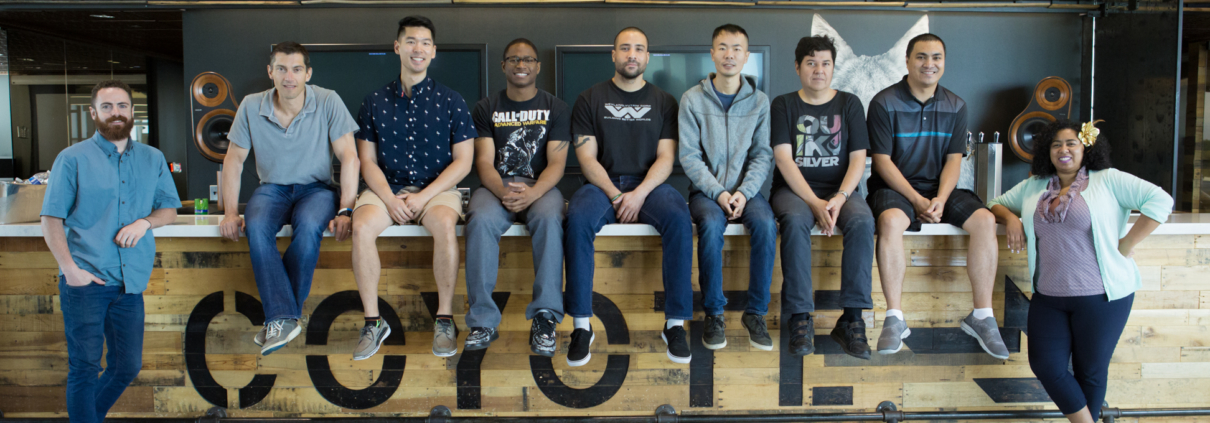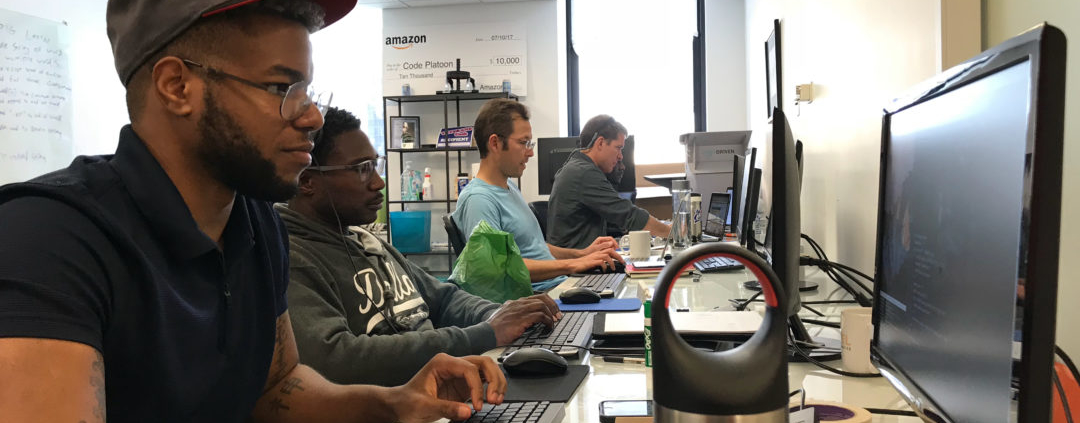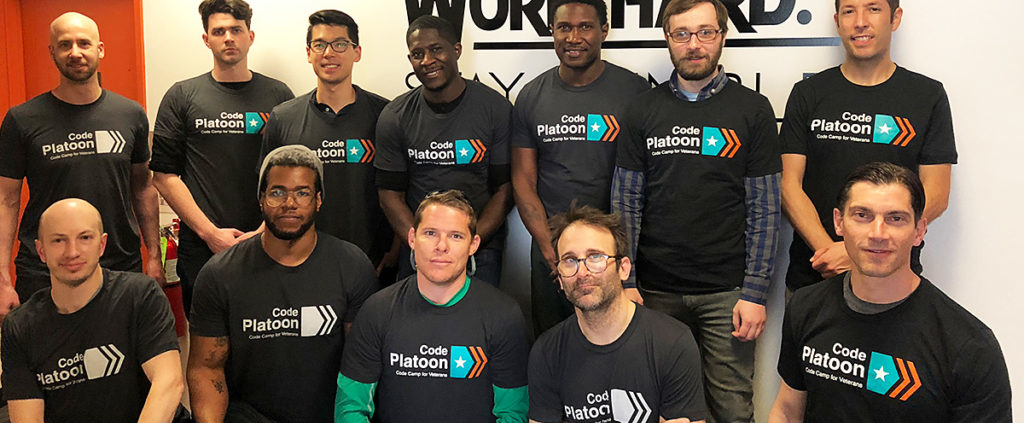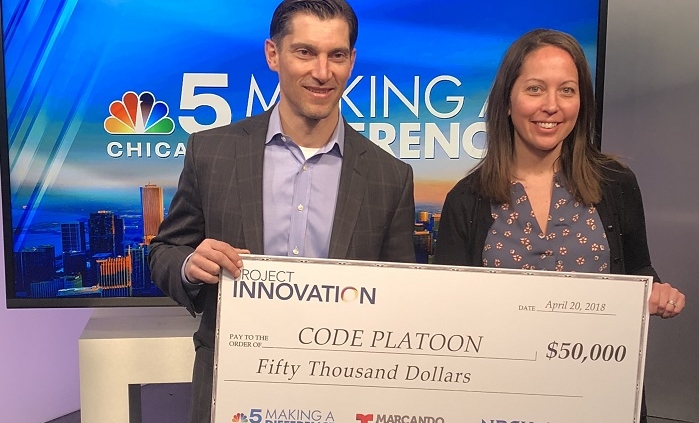Snapper Ploen is a Digital Marketing Manager at MCG who served on the design, content and advertising teams at Code Platoon. The following is a reproduction of his original blog post which is posted here:
https://www.mcg.com/blog/2018/05/10/transforming-veterans-into-software-developers
As an employee of MCG, you are part of an important mission which includes moving people toward health and improving the patient journey. However, it also grants you the opportunity to impact the community and help those in need. Last year, MCG began offering its employees the option to use 16 hours of paid company time per year to volunteer with an approved non-profit of our choice. With a large number of organizations in need of help, choosing whom to serve can be overwhelming. My fellow MCG team members supported local food banks in both San Diego and Seattle, and after hearing their stories, I did some research into groups who were looking for assistance.
WHERE TO VOLUNTEER?
As I browsed VolunteerMatch.org for requests, I asked myself a few questions:
- Who has a mission that is changing lives with a long-term impact?
- Could my efforts somehow address multiple issues affecting our society right now?
- What unique skills do I have that could best help them?
As I considered the options, I took some guidance from current events in my life: My nephew had just enlisted in the U.S. Air Force and joined a long line of family members who had already served in the military. I was very proud of him and attending his graduation was a milestone of 2017. In addition, MCG has been in discussion with legislators in Washington D.C. to improve healthcare delivery for military personnel at the Department of Veteran Affairs. Between these events, my mind was already focused on the veteran community. Around the same time, my friends working in software engineering mentioned that recruiting qualified candidates was growing increasingly difficult. It’s no secret that automation is replacing much of the manufacturing job base in our country, and writing the software that provides much of this automation is where job growth appears to be headed. The Bureau of Labor Statistics forecasts a 24% growth in software developer demand by 2026 with median pay for this field hovering around $103,500 in 2017.1 Finally, I knew I wanted to offer my creative abilities because I felt they were the most valuable thing I had to contribute.
CODE PLATOON: A CODE CAMP FOR VETERANS
Through my search criteria, I found a Chicago-based coding boot camp exclusively for U.S. veterans called Code Platoon. This non-profit outfit provides a unique learning environment where vets can learn alongside other vets to become full stack developers. It offers in-person and remote learning pathways as well as generous scholarships that pay virtually 100% of the tuition. With 15 weeks of intensive training, Code Platoon veterans can learn:
- Programming Languages: Ruby, JavaScript, HTML and CSS
- SQL Database
- Frameworks: Ruby-on-Rails and React.js
- Version Control using Git
- APIs
- Object Oriented Design
Code Platoon also supports veterans transitioning from military life to a civilian career by offering three- to six-month internships during which the hiring organization can “vet the vet” to see if they align with the company culture. Many veterans seem to do well in the software field as it is a natural fit considering the structure-oriented work and mental discipline required – particularly in cybersecurity and software architecture roles. Veterans also tend to perform better in stressful situations, and in today’s rapidly changing IT environment, this can be a highly valuable quality in a software developer.
Although most veterans are eligible for G.I. Bill benefits and can pursue a four-year college degree, many do not have a transitional environment that includes learning alongside other veterans. And while a four-year degree may be the appropriate option for some, others are seeking an expedited route to an in-demand career that offers rewarding challenges and a competitive salary. Code Platoon can help them achieve those goals at an accelerated pace, and students who chose the in-person learning path still have the option to apply their G.I. Bill benefits towards the program’s tuition.
HOW I HELPED
After submitting my application to become a Code Platoon volunteer, I attended a few conference calls with the organization’s leadership. Rodrigo Levy, the founder and CEO of Code Platoon, always puts the veteran first, and he wanted the organization’s branding to reflect that focus. He was keenly aware that trust is vital to U.S. military vets, and it is something they’ve held in the highest regard since their days at basic training. He also emphasized how much they deserve transparent information. Trust and transparency are sacred values at MCG, so I already felt like I was on familiar ground with Code Platoon.
My role was to help update Code Platoon’s branding and develop some recruitment collateral that could support efforts in raising awareness of the program. We started by redesigning their logo which includes a variation of the military chevron symbol with the stripes pointing right to denote progression and forward movement. After that, we developed a brand style guide which included some bold color choices to make us stand out in the overcrowded coding camp community. After that, we developed print collateral for career fairs and corporate partnership outreach. We then moved on to their website, and I collaborated with a very talented web dev pro named Bob to align the look with the new branding. Recently, I have taken on their paid search campaign management (AdWords), and I am working their content team to optimize their email marketing so we can keep potential veteran students interested and engaged.
What have I learned from all of this? Well, first of all, it’s not always common that your employer will let you use work time to help a community in need. For that, I am extremely grateful to MCG, and our parent company Hearst, for being so supportive of this endeavor. Even though I rapidly used up my allotment of company time, I chose to stay committed to Code Platoon. I continue working weekends and after regular work hours to provide support when needed. Secondly, I have to say I’ve never experienced a more productive volunteer collaboration than I have with the people at Code Platoon. These are dedicated people who are genuine about helping our veterans achieve productive and successful careers in software development. This opportunity – along with the work I do every day at MCG – serves as a reminder to myself that even though I am just a single individual, my contributions can help deliver something positive to the world and give back to people who have sacrificed so much for all of us. In the bigger picture, my role is small, but it gives me a great deal of fulfillment to help vets join the rising tide of technology professionals.
Snapper’s contributions to Code Platoon have been indispensable to our continued growth. Snapper re-designed our branding (which outperformed two other designs by wide margin), and helps us – strategically and tactically – with messaging and advertising. Special thanks to MCG for allowing him to use company time to help us support veterans pursuing a career in software development. We are very grateful to them for their generous volunteerism policy.
In closing, I want to add something that isn’t particularly profound but always worth repeating: Education is one of the most transformative tools that we have in life. Learning new skills doesn’t just improve your career; it allows people to elevate their socio-economic status, it benefits interpersonal relationships, and it can put you in a position where you can help others rise to their full potential. When pursuing an education, it certainly helps to have lots of time and financial assistance, but the first step is having the courage to believe in your ability to learn and adapt. Even if you’re not a veteran with a dedicated group of people supporting you, self-motivation and access to a public library or the Internet can yield wonders for your skillset. And if you ever doubt what you can achieve just think of all the honorable individuals who answered the call of duty for our country. They did it so that we can all enjoy life, liberty, and the pursuit of happiness. Don’t waste the opportunities they’ve afforded you – always strive to learn, grow, and adapt.
And never fear the future.
– Snapper S. Ploen, Digital Marketing Manager, MCG











